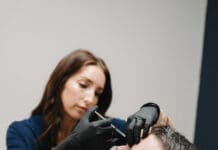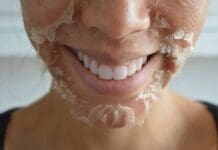By Bridget Sullivan, PA-C, Coastal Skin Surgery and Dermatology, PCB
I often say to my patients: “Everything is related. One part of the body is not separate from the other.” This can be true for our emotional and physical health too. This article will highlight how stress can have an adverse effect on our skin and hair health.
When we go through stress – physical stress or emotional stress – this can have negative consequences on our skin and hair. Physical stress to our body includes surgeries, pregnancy, extreme changes in weight, and sickness or illness. Emotional stress includes things like death of a loved one, divorce, a major move, starting a new job or a job loss. When we undergo stress, our body releases a hormone called cortisol. This hormone can be helpful in a flight or fight situation but can be damaging if the cortisol is released for a long interval of time. An increase in cortisol causes an increase in sebum or oil production in our skin. Increased sebum production increases our acne flares. Increased cortisol can also cause increased inflammation in the skin. This will flare up skin conditions of rosacea, eczema, and psoriasis. Increased cortisol can also cause increased mast cell activation and that can cause itching and scratching. All in all, chronic increased levels of cortisol can lead to negative impacts on our skin and immune system.
Physical and emotional stress not only affects our skin, but it can also affect our hair. There is a medical condition called telogen effluvium, which is hair loss following an incredibly stressful event in our life. The stressful event shocks the hair from the growing phase or antigen phase to the shedding phase or telogen phase. You will start to notice massive shedding of hair. A lot of women will notice this after childbirth. This condition is usually reversible, and can last between three to six months.
How can we combat stress? Some simple tools that we can incorporate into our daily life to help reduce stress are: 1) Practicing gratitude. This can be done by writing down 3-5 things every day for which you are thankful. 2) Having a regular exercise routine is important. Try to include a thirty-minute walk into your day. 3) Getting proper and sufficient sleep is essential to our overall health. 4) Lastly, a healthy and balanced diet is imperative for good health. Anti-inflammatory foods include dark green leafy vegetables, berries like blueberries and raspberries, vegetables like spinach and kale, and green tea.
Having a healthy and balanced lifestyle will not only have a positive impact on our emotional health but will also be impactful to our skin and hair health. Beauty starts within!





















































